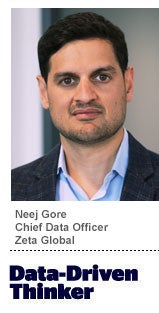“Data-Driven Thinking” is written by members of the media community and contains fresh ideas on the digital revolution in media.
Today’s column is written by Neej Gore, chief data officer of Zeta Global.
The potential of data-driven marketing is entering a brave new world. The explosion in consumer data availability over the last few years has only been exceeded by marketers’ aspirations to find new ways to advance customer relationships and improve value exchanges. But as complexity increases, marketers must look toward a solution that simplifies data-driven marketing: agile intelligence.
Agile intelligence is a technology-enabled approach that helps marketers visualize, explore and take action against the most pressing business questions without depending on other departments, such as IT. Sitting at the intersection of business and marketing, agile intelligence provides easy cross-pollination of market, customer and location data through a Customer Data Platform (CDP), enabling real-time decisions.
Here are four ways agile intelligence can shape not just your marketing strategy but also your overall business strategy.
1. Get real-time, data-driven answers to business questionsBecause agile intelligence enables instantaneous overlays of first-, second-, and third-party data sets with visualization, it offers marketers powerful insights, answering questions like how to segment customers, where to open or close brick-and-mortar stores, which products will perform best and the likelihood of hitting key goals.
For example, one sports retailer leveraged agile intelligence to unearth that while the top 10% of customers generate 40% of revenue, they also account for over 80% of sportswear purchases. They also learned that most of their customers exclusively purchase sportswear in a very specific order: apparel, then equipment.
This insight enabled the company to identify and target three million high-value prospects in specific regions throughout the US. They then used customizable filters to interrogate the data in real time, resulting in more revenue-generating campaigns.
2. Encourage curiosity and action with visualization
For businesses to take advantage of data, they need environments where they can be curious and explore. For example, the travel and hospitality industry can greatly benefit from the visualizations that agile intelligence provides by comparing patterns at airports and hotels throughout the country.
Visualizing KPIs such as unique customers at each destination, average spend per flight/night, advanced time to booking, loyalty program members, and method of booking in real time, brands would be able to actively market to prospects searching for flights or rooms within given regions.
3. Support collaboration across departments
Agile intelligence democratizes data through a centralized system. It serves as an extension of the CDP, creating natural connections to operations, analytics, research, real estate, merchandising and other teams. These groups can then collaborate to hit individual and overall business goals.
For example, in retail, marketing teams can work alongside real estate teams to determine where to increase and decrease their regional presence based on competition, consumer intent, regional activity and overall performance of each of their stores.
4. Automate common data science initiatives
With agile intelligence, you can get predictive insights faster and in a more automated way. It eliminates the need for external consulting services and brings everything in-house. Without the need for data science initiatives such as RFM segmentation and lifecycle analytics, your team can anticipate customer behaviors more rapidly and accurately. Meanwhile, the data science team can focus on more innovative efforts that advance the business.
Agile intelligence has tremendous potential to transform data from a nice-to-have to a true business asset. With the right data, you can conduct your business at the speed of change.
Follow Zeta (@ZetaGlobal) and AdExchanger (@adexchanger) on Twitter.













